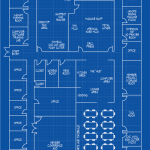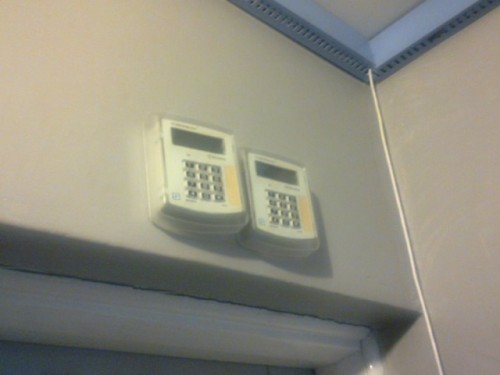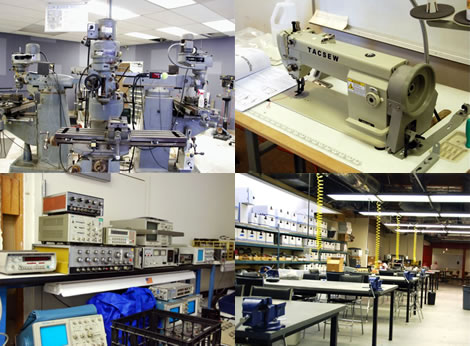Across Africa there is a vibrant culture of people creating things. Hardware products. It’s rarely glamorous as our inventors and micro-entrepreneurs innovate on products due to necessity – there simply aren’t enough jobs and they need to feed their families.
Regardless of the reasons why they do it, what this has created is a culture of innovation.
When you have a problem in Africa, there isn’t another option, you either improvise, adapt and overcome, or you die. You don’t give up, you figure out a way to make things work.
This environment has bred a generation of problem solvers: people confront immense challenges and keep at it until a solution is found. It might not always be the most beautiful solution (usually the finishing isn’t up to par), but it works and that’s what matters.
Concurrently, we’re a net importer of fabricated products from around the world. We might make some of our own software now, but we do little to nothing with hardware. How can we be the masters of our own future if we don’t do any meaningful levels of fabrication?
A while back I wrote about the need of “hardware hacking garages” in Africa, a place where the innovation and inventions that deal with things you can actually put your hands on happens. I think this is our next frontier to explore: fabrication and manufacturing.
Moving from FabLab to Fab Factory
The one place that we do do some type of fabrication, at least where we explore and invent, is the network of FabLab’s across the continent. They are very much university focused (and constrained), but they have had a great amount of innovation coming out of them as well. In Kenya, Kamau Gachigi runs the one in Nairobi, and it has been a model of both invention and innovative revenue streams to keep itself going and to bring in funds to the engineers working through it.
The FabLab is small though. What would happen if you put it on steroids and made it 10x larger? What if we were talking about a Fab Factory instead?
A Factory
 A space that has all the machines needed to fabricate prototypes and manufacture pieces in at least small quantities. It would need machine tools, laser cutters, 3d printers, wood working tools and more. A place that you could rent time on the machines, rent a workshop, and get training on the machines you don’t know how to operate. Something that looks a lot like the TechShop in San Francisco, but tweaked to work in Africa.
A space that has all the machines needed to fabricate prototypes and manufacture pieces in at least small quantities. It would need machine tools, laser cutters, 3d printers, wood working tools and more. A place that you could rent time on the machines, rent a workshop, and get training on the machines you don’t know how to operate. Something that looks a lot like the TechShop in San Francisco, but tweaked to work in Africa.
A Warehouse
Take the Factory model, and layer on a warehouse. There are some items that we will not make on our own, namely computer chips. Having a warehouse would allow group buying to happen, where economies of scale could be reached for supplies to be brought into the country, as well as serving as a central facility for distribution of these items to the community.
A Nodal Network
Having a central “factory” and “warehouse” provides many benefits, but it’s not enough. As we know from 3 years of running Maker Faire Africa events, many of the most interesting inventions come from rural areas, mainly due to the fact that they have strong commercial upside. In this case it makes sense to take the original FabLab model and export that to the major cities around the country, making these types of capabilities much more accessible to a wider user base.
A Tech Store
Beyond building and inventing, there’s a gap where the people creating things can take them to market. Providing a space for these people to sell their products (and services), provides a bigger target for buyers, both consumer and b2b buyers to find new items. It also provides a much needed stream of income for the small-scale inventors, with the potential to put them on the map for efforts to commercialize and scale their work.
Ideas and Examples
A couple examples of things that could be built locally, while at the same time keeping the money in-country and increasing technical capabilities in the market:

- In Kenya, the local energy company is moving to pre-paid meters for home electricity. These are simple boxes, imminently hackable, and all made in China. Why? These could be fabricated right here in Kenya, and made better, cheaper.
- The Kenya Wildlife Service needs UAVs for tracking poachers and remote viewing of the parks. They’re currently spending large amounts of money on imported ones. We can build those here too, to the standards needed, and for a lot less.
Emeka Okafor, my organizing colleague for Maker Faire Africa, has been on this fabrication thing for years. He has even more examples of small scale manufacturing on his blog at Timbuktu Chronicles.
I imagine a place like that would get immediate use in certain markets; namely Kenya, Ghana, Cameroon and Nigeria, though others might line up quickly as well. It certainly makes sense for the governments in these countries to invest in this future, or at the very least to incentivize this type of ownership of our own technological future.
What I’m wondering is what other models are there like this?
If building the iHub, m:lab and Ushahidi have taught me anything, it’s that getting something going is the most important thing you can do. Do something, even if small. Get traction. Get started.
The answer isn’t to wait on the government, even though we all see the argument for them being involved here. I imagine the next step is to raise some money, find a space and get a few fabrication machines in place. It will grow from there. Standby for this in Nairobi soon. It has to happen, and it will happen.
This will take money. Anyone interested in getting involved?
(On a sidenote, I’m finally getting to visit the TechShop as I’m in San Francisco this week. Very excited about this!)

February 23, 2012 at 3:27 am
I have long been dreaming about building an ETR (or more likely ESD) machine locally, in the hope of bringing down cost of doing VAT in Kenya, while also havily integrated with Uhasibu 😉
However so far KRA have not been very forthcomming with the requirements for the devices…
March 1, 2012 at 3:46 pm
we have an idea on the table …
to manufacture solar panels in ghana for sales into those areas with no power. planning and idea stage
March 4, 2012 at 11:57 am
Another thing we need is a list of GOOD materials than can be used. Not toxic chemical products, but those that are beneficial to the environment. Coupled with the hardware factories as described above, I see Africa heading into the right direction.
Interestingly, though, the “modular”-approach we have in Europe (~ something breaks and is replaced by another 100% copy from the hardware store) was reinvented or re-adopted in Africa – like the lawn mower petrol engines we’ve featured on AfriGadget that are modified into multi-purpose machines and can be rented for a given time (~ 15 minutes). This modular approach (repainting a car in Nairobi = you buy the color in ml units, hire the fundi for 30 min, hire the machine and the pain pistol) is the added advantage we have in Africa, imo. You won’t have this flexibility in Europe.
March 10, 2012 at 3:13 pm
I love the idea of making something going, however little, and then it picks traction. I think the problem we have had in Africa is talking too much and doing too little; I know we have good oral tradition but we need to begin emphasizing the act of doing and learning and improving as we go along. I recently saw a video of an Indian family, poor family in a village, making match boxes! That’s where we need to head to, we need to instill a “backyard industrial culture” in our people, Mao-style 🙂 although not in a violent manner 🙂
March 21, 2012 at 3:49 am
Fab Factories! I’m interested…the contact form doesnt seem to be working…always thought about drones for the somali border
March 23, 2012 at 1:20 am
Excellent article, Erik. Indeed you and I and others have been discussing this at great length. No doubt in my mind, the time is now. There are certain things the centers need to have: First, there must be a string teaching culture, taking advantage of all the modern facilitation for this already available: video/audio/text instructables, videod lectures (see udacity – this is a evolution underway in the delivery of tertiary education!) then peer-learning where gurus at the center prepare introductory classes on generic things users should know (basics of CAD/CAM, coding for micro controllers, PCB fabrication and micro controller programming (arduino’ fabduino and beyond), embedded computing, machine-to-machine comms, etc. (see what we do in Fab Academy here fabacademy.org). This is to up the game for the makers we have and introduce a whole new crop. The supply side of tech innovation is critical -trained people. This must offer certification, demystify the need for degrees. Then incubation services must be availed, and angel investor networks encouraged. There’s much more and I’m glad we’re working in this. As you said, “please express interest and we’ll make participation possible” (paraphrasing pg you there, Erik)
May 23, 2012 at 8:21 am
@jke – really worthwhile point about the modular approach, I’ve seen this too with solar-powered DC microgrids that have been designed for use in informal settlements (http://www.specializedsolarsystems.co.za/) One of the cool design features is that the power system can be disassembled when residents return to their rural homesteads and can be used there because of its off-grid, plug-and-play design.
November 29, 2012 at 12:11 pm
Hi! The problem with Kenya at the moment, is that, If I want to invest in such an idea, it has to somehow feed the table. Not many people have the level of wealth to be able to gladly follow such ideas with no remorse whatsoever. I have also been thinking about the same thing for a long time now, and the one obstacle I keep on running across in my mind, is the fact that, shouldn’t I rather invest in things I know might work, rather than a wonderful dream”. Maybe if a group of local guys with similar interests can come together and come up with some form of techies investment crew/ team, it might work” The question is who is gonna break the question of how to monetize such an endeavour in Kenya. I don’t hesitate to say, whoever does it, I will imitate their every step soon after, and I will be shameless about it